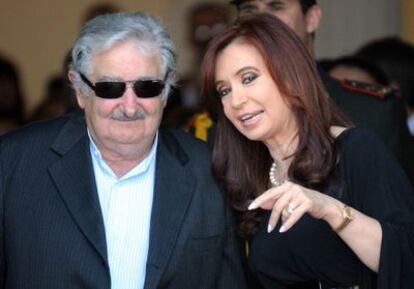Mercosur looks at legal impediments to Venezuela's entry into trade bloc
Lawmakers in Paraguay and Uruguay say Chávez won't respect democracy
South America's Mercosur on Tuesday decided to set up a special commission to study the possibility of admitting Venezuela and Ecuador into the regional trade bloc even as many members argue that their entry could threaten the group's founding principles.
Venezuelan President Hugo Chávez came to the summit in Montevideo with warnings that bureaucracy among the different nations could threaten the unity of the entire organization. Venezuela's membership has been stalled for six years by Paraguay, where Chávez's critics dominate the national assembly.
According to Mercosur rules, the parliaments of all member nations have to approve the entry of any new associates. Venezuelan membership has been approved by Brazil, Argentina and Uruguay, but the Paraguayan senate insists that Chávez won't respect the rules of democracy.
Some in Uruguay are also against the approval of Venezuela's entry. Conservative Senator Luis Lacalle, who co-founded Mercosur during his 1990-1995 term as Uruguay's president, called it a "death sentence, because the treaty has its legal requirements and they've ignored them. They are mortally wounding Mercosur."
Without mentioning any nation, Chávez said that there "were dark hands from the past interfering with this summit." He added that while there are "unmentionable interests that continue to prevent Venezuela's full membership in Mercosur, we still feel like members."
Despite Chávez's strong words, Venezuela and Ecuador, whose president Rafael Correa was also present in Montevideo, didn't press the issue. Uruguay's current leader, José Mujica, tried to convince Paraguay to change its mind, but Paraguayan President Fernando Lugo, who had been warned by opposition lawmakers back home to respect their decision, said that the Mercosur rules cannot be broken.
Instead, Mujica, who is currently serving as Mercosur's rotating president, decided to set up a special panel that will have three months to determine what legal and political requirements Venezuela must meet to join the regional group, the Asunción daily UltimaHora reported on Wednesday.
The summit began in tragedy when one of the top members of the Argentinean delegation was found hanged in his hotel room. Montevideo police say there was no evidence of foul play after they discovered the nude body of Iván Heyn, a deputy trade minister, with his belt tied around his neck. Police said that the official had just taken a shower before the incident occurred.
The news deeply affected Argentina's President Cristina Fernández de Kirchner, who had to leave the summit meeting for about an hour after she was told of the death, the Buenos Aires daily La Nación , reported, adding that she didn't know him very well.
The 34-year-old Heyn was a Peronist youth leader who had just joined Fernández's government following her swearing-in ceremony earlier this month.
"We are working on the theory that it was a suicide but we are also working on a second possibility, one that it is a little weaker, that it could have been an accident," said police spokesman José Luis Rondán.
In another issue, Mercosur signed a controversial free trade agreement with the Palestinian Authority - the first between the territories and a bloc of nations outside the Arab world. It is mostly a symbolic move because Israel strictly controls imports and exports involving the West Bank and Gaza Strip. Palestine's Foreign Minister Riyad Al Maliki thanked Brazil, Argentina, Uruguay and Paraguay for following through on their recognition of the Palestinian territories as a sovereign and independent nation.

Tu suscripción se está usando en otro dispositivo
¿Quieres añadir otro usuario a tu suscripción?
Si continúas leyendo en este dispositivo, no se podrá leer en el otro.
FlechaTu suscripción se está usando en otro dispositivo y solo puedes acceder a EL PAÍS desde un dispositivo a la vez.
Si quieres compartir tu cuenta, cambia tu suscripción a la modalidad Premium, así podrás añadir otro usuario. Cada uno accederá con su propia cuenta de email, lo que os permitirá personalizar vuestra experiencia en EL PAÍS.
¿Tienes una suscripción de empresa? Accede aquí para contratar más cuentas.
En el caso de no saber quién está usando tu cuenta, te recomendamos cambiar tu contraseña aquí.
Si decides continuar compartiendo tu cuenta, este mensaje se mostrará en tu dispositivo y en el de la otra persona que está usando tu cuenta de forma indefinida, afectando a tu experiencia de lectura. Puedes consultar aquí los términos y condiciones de la suscripción digital.








































